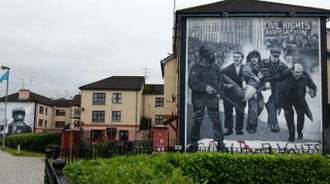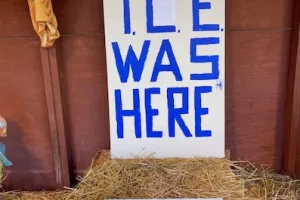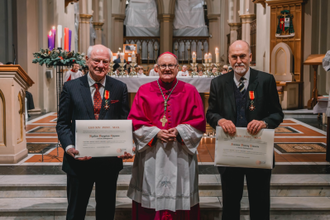The Death of a Good Man - Former Bishop of Derry laid to rest

Bloody Sunday Mural by The Bogside Artists, part of the People's Gallery, Derry - where Bishop Edward served for over three decades
Bishop Emeritus, Dr Edward Daly will be laid to rest later today in Northern Ireland's second city.
To the outside world this moment will be just that, the passing of a much loved, retired 82 year old pastoral leader.
But to those within the boundaries of Derry City, it will mean much, much more.
As well as the loss of an immediate connection to a past just far enough way to be considered history but close enough that it still hurts, the death of Bishop Edward Daly, or Eddie as he was better known to his flock, marks the passing of a good man.
From the moment he appeared on camera on Bloody Sunday, on January 31st 1972, carrying a blood soaked white handkerchief to try and clear the way to call for an ambulance for a dying 17 year-old victim of British paratroopers who had opened fire indiscriminately on a civil rights march, Eddie Daly became a hero in the eyes of the world.
However his reputation and the trust that would last over four decades, in the Bogside and wider parish of St Eugene's was already well established. It had grown out of regular weekly visits to the homes of sometimes three generations of one family consigned to live in tenements because of political gerrymandering by the ruling Unionist administration.
One former parishioner described the young curate as curious, respectful and patient. "He was always listening more than talking. And you got the impression he heard, he really heard," he added.
In 1974 he became Bishop of a city mired in grief and rage and held the line for what he saw as 'his people', through two decades of political turmoil, armed resistance, state violence and eventually approaching political settlement and a fragile peace.
He was a thorn in the side of the British government through his relentless campaigning for just solutions to the open sores of the Bloody Sunday families, the Birmingham Six and The Guildford Four, as well as to the IRA, angry that he dared suggest people should call the despised Royal Ulster Constabulary (RUC) and banned paramilitary trappings in church during the funerals of their dead.
Amidst the cacophony of biting political resentment, sectarian bitterness and deadly political gamesmanship, his voice remained steady, uncompromising when it needed to be but above all compassionate. Committed to ecumenism as a way out of the political deadlock for the people who suffered most as a result of the violent conflict, he worked closely with the leaders of other Christian denominations ensuring that their message of equality in the eyes of God was seen to be not just believed but followed by those at the very top of the religious firmament.
After his retirement due to ill health in 1993, Bishop Daly devoted the rest of his life in the Church to ministering to the terminally ill at the city's Foyle Hospice. There he built another reputation with a new generation of citizens eager to move on from the past - and in many cases away from the Catholic Church - who experienced his compassion at first hand by the bedsides of their dying friends and relatives.
And he didn't stop voicing his opinions regardless of who disagreed with them and that included the institution of the Catholic Church in Ireland. In his second set of memoirs published in 2011 Bishop Daly called for priests to be able to marry if they chose to do so, saying there was a place for both married priests and those who chose to be celibate in the priesthood.
In the months before his death, despite the cancer that 'has walked with me since the late 1970s moving from inside his body onto his skin, the Bishop continued to greet visitors from overseas and down the road alike in the faded grandeur of his home in the city's Steelestown Road.
And he continued ministering to the men and women who bore heavy legacies as a result of the conflict that had marked Derry out for global notoriety as they approached him in the aisles of his local supermarket during his weekly shop, talking of their loss, hurt and trauma at the years they felt they had wasted for a cause they were no longer sure existed.
At the end, despite the pain and the ill health that had plagued him for over four decades, the Bishop who described himself as being 'at peace with it all but missing the theatre', was still listening.
After a three day public wake, Bishop Daly will be buried at the door of St Eugene's Cathedral near the city centre, following the Requiem Mass at 3.30pm
Bishop Daly wrote two sets of memoirs 'Mister, Are you a Priest' (2000) and 'A Troubled See: Memoirs of a Derry Bishop' (2011) both published by Four Courts Press and a book on ministering to the terminally ill 'Do Not Let Your Hearts Be Troubled: Thoughts on Ministry to the Terminally Ill (2004) published by Veritas.
















